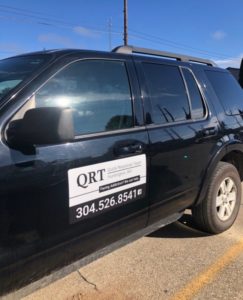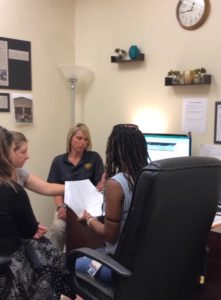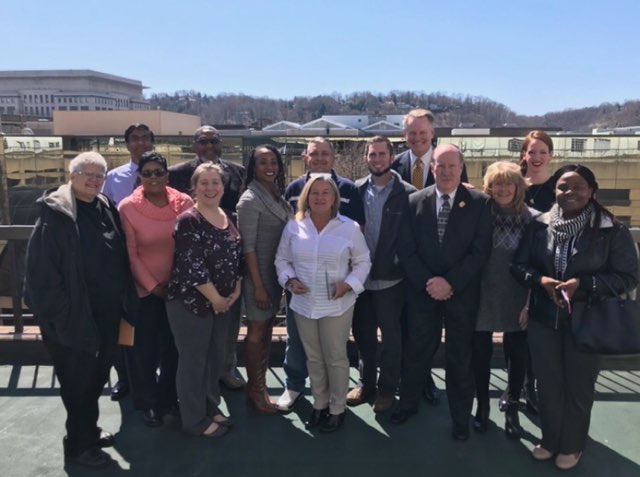The Huntington Quick Response Team: The Face of Opioid Overdose Healing
By Melanie Raskin
It was a bad day in Huntington, West Virginia. In an eight-hour period in 2016, 26 people overdosed on opioids. And then something worse happened: Not a single one of them received a follow-up. They were alone. That was the tipping point that turned a bad day into a powerful catalyst and united an entire community — the local hospital and EMS, government, small businesses, and agencies — to step in and heal the problem, together. The face of healing the opioid overdose crisis in Huntington is the QRT, Quick Response Team.
Inspired by an Ohio model and funded by two 2017 federal grants, the Huntington QRT visits people with substance abuse disorder (SUD) who have recently overdosed to check in, share information about helpful resources and ask the all-important question: Are you ready to enter a program? Composed of a paramedic, a counselor/recovery coach and a law enforcement member, the team works its mission of care and support with a philosophy of meeting people where they are. But they are also willing to go beyond where people are, taking them where they want to go, too. If a person with SUD says yes to getting help, the QRT stands by them, right then and right there, as they make that first critical phone call to a treatment program.
Help Is Good — More Help Is Better
It’s powerful work, but the team quickly discovered something vital was missing. The area’s 300 churches knew exactly what it was: them. Initially, the faith community was invited to make peanut butter and jelly sandwiches for the QRT to share with the people they visited and to open their food pantries to people with SUD. Led by the Huntington Black Pastors Ministerial Association, the ministers decided they wanted more: They yearned to be on the front line, walking side-by-side with the team, knocking on doors and solving the problem. The Huntington QRT became the first in the nation to include a pastor as a spiritual safe haven, caring listener, and gentle encourager. And for an addict who feels unseen, unheard and unworthy, that can be a gift from heaven.
 “In the beginning, several pastors came to me and said, ‘I’m tired of doing funerals for young people. I want to change all that and help.’ Participating in the QRT was the answer,” says Connie Priddy, former ER nurse and the Huntington QRT program coordinator. The program is based at the Cabell County EMS, the ambulance service that serves every overdose call in the county. From the beginning, the churches were all in. The team has had as many as 30 ministers working four-hour shifts, Monday through Friday, noon until 8 p.m. Churches still donate peanut butter and jelly for the signature team offering of a sandwich to the people the team visits. But they also show their support in other ways. One woman at a local church knitted scarves and hats for the team to distribute in the winter. Another group organized a coat donation. The work can be hard sometimes, but it is always rewarding. It’s so rewarding that the pastors have upped their game — and their investment in the community — by expanding their support beyond SUD. Pastors have attended education sessions on HIV, rape and human trafficking as well.
“In the beginning, several pastors came to me and said, ‘I’m tired of doing funerals for young people. I want to change all that and help.’ Participating in the QRT was the answer,” says Connie Priddy, former ER nurse and the Huntington QRT program coordinator. The program is based at the Cabell County EMS, the ambulance service that serves every overdose call in the county. From the beginning, the churches were all in. The team has had as many as 30 ministers working four-hour shifts, Monday through Friday, noon until 8 p.m. Churches still donate peanut butter and jelly for the signature team offering of a sandwich to the people the team visits. But they also show their support in other ways. One woman at a local church knitted scarves and hats for the team to distribute in the winter. Another group organized a coat donation. The work can be hard sometimes, but it is always rewarding. It’s so rewarding that the pastors have upped their game — and their investment in the community — by expanding their support beyond SUD. Pastors have attended education sessions on HIV, rape and human trafficking as well.
Sometimes, things happen, and we are called to do and be more. Jana Stoner, former director of FaithHealth Appalachia and now health program officer for Pallottine Foundation, which supports transformative health initiatives that empower all individuals to lead lives of optimal health, self-reliance and self-respect, was one of those people. She was serving a local church when she heard the news of the 26 overdoses. “I was struggling with how in the world a community with 300 churches got here, where there is such hopelessness and despair and loneliness,” she says. “If I am a person of faith, then why am I not doing something? My personal journey is, if I believe what the scriptures tell us, then why not be brave and loving and look at those who are struggling as if they are the face of our loving God? So, I made a commitment to be a part of what is happening here — the good, the bad, the ugly, the joyful — and help create a solution.” Stoner, a part of the QRT program from the beginning, recruited and trained pastors for the team.
A Continuum of Care That Benefits All
A surprising outcome of adding a faith component to the QRT was that the pastors quickly began pulling double-duty, ministering not only to the people struggling with SUD but also to the first responders who were experiencing compassion fatigue from visiting the same addicts countless times. Change is hard. Sometimes addicts overdose again. And again. Some die. Frustration, stress, loss and grief are constant companions to the QRT, along with hope, passion, dedication and care. While the QRT is designed to help stop the opioid overdose cycle and support people choosing treatment and wellness, often the people in need of support were the team members themselves. The pastors were good listeners and spiritual advisers, helping QRT members through the tough times — and feelings. It’s a well-rounded continuum of care for both the receiver of services and the giver.
“Our law enforcement and paramedics have been dealing with this for so long, it was easy to get compassion fatigue and burn out, to feel cynical about the problem,” Priddy says. “Our unique QRT approach of truly helping and not just applying a band-aid has renewed the spirit of everyone on the team.” Success stories fuel Huntington’s human engine of care. One off-duty QRT member working his law enforcement shift stopped a vehicle with two users. The woman in the car wanted to enter treatment, so the officer called in his QRT 24 \ Fall 2020 FaithHealth colleagues to help. A year later, he was in a gas station, and a woman he did not recognize came up and thanked him: It was that same woman. She had successfully completed treatment and was now on the other side of the intake desk as a counselor in the facility. Now, she was in the position to help someone, all because of him and the QRT. “The QRT changes the way you feel about people with SUD,” Priddy says. “Now we have a tool for doing good — and it’s a tool we can share. We keep our EMS ambulances stocked with QRT cards that EMTs pass out. They don’t want to go back to the same person over and over. They want more than just a band-aid, too. Many times, they have brought in an addict they’ve shared information with and told them, ‘Hang on, someone is coming to see you and help.’”
But being all in doesn’t necessarily mean being in charge, Stoner is quick to point out. The QRT’s role is not to have all the answers; it’s just there to support. “Sometimes there can be a top-down approach to creating change from funders, government, advocates and other community decision-makers,” she explains. “But really, the local people experiencing the problems and working for solutions are the experts. The person with SUD has a long journey of recovery — we can’t do that for them. They have to be willing and want to change. But it doesn’t hurt to have a friend. We can be that friend. Our role is to help, walk beside them and support their decision.”
Connection, Not Intervention
Priddy feels the strengths of the Huntington QRT are their genuine care and diversity. “We have men and women of all races and ages, ranging from in their 20s to 70s,” she explained. “And our churches come from every denomination —  and no denomination. We’re all united in one purpose.” People with SUD feel that care, see that diversity and are lifted up by that purpose. Regardless of the outcome of the visit — and there have been hundreds since 2017 — the gratitude is profound. “I was getting to be a cynical, old nurse, and God put this in my path,” Priddy says. “It’s been humbling. Some people fall through the cracks and get lost. But it’s our job to care enough to find them — whether it’s at a gas station, at the overdose scene, in a house or in a park. And just about every person is nice. Even if they’re not ready for treatment, they appreciate someone checking in, asking how they are, bringing them resources. To have people looking — and looking out — for you and saying, we care and are here for you, is powerful.”
and no denomination. We’re all united in one purpose.” People with SUD feel that care, see that diversity and are lifted up by that purpose. Regardless of the outcome of the visit — and there have been hundreds since 2017 — the gratitude is profound. “I was getting to be a cynical, old nurse, and God put this in my path,” Priddy says. “It’s been humbling. Some people fall through the cracks and get lost. But it’s our job to care enough to find them — whether it’s at a gas station, at the overdose scene, in a house or in a park. And just about every person is nice. Even if they’re not ready for treatment, they appreciate someone checking in, asking how they are, bringing them resources. To have people looking — and looking out — for you and saying, we care and are here for you, is powerful.”
The QRT’s work is not an intervention, it’s a connection. And connection can be hard during the coronavirus pandemic. Plus, the pandemic revealed a bleak picture of the disparities in Huntington neighborhoods. The first seven weeks of COVID, the QRT did not make face-to-face visits. In May, they began their work again, inviting a smaller pool of about a dozen pastors to join them, slowly incorporating them into the new process.
Real Care for Real Results
Ten years ago, if you polled Huntington’s citizens, you’d find a handful who knew someone with SUD. In the last five years, it seems everyone has lost a loved one to opioids. Giving a real face to addiction and meaningful support through the QRT has resulted in real results: The first two full years of the program (December 2017 through 2019), the overdose rates dropped an impressive 52%. The team has engaged with 900 people (and tried to locate others) and have helped nearly 300 (approximately 30%) enter treatment. The hope is that Huntington’s model of including the faith community on the team will go national.
The biggest lesson the town has learned — and is teaching — is that no single person or group is healing this community. Everyone has a role to play. “It’s a multifaceted approach,” Stoner states. “It’s the use of naloxone to revive people who have Od’d. It’s harm-reduction with needle exchange. It’s the front-line workers in the homeless and domestic violence shelters helping to direct people to resources. It’s the health care system that leveraged $2 million to launch ProAct, which provides multiple services in one building for people with SUD. It’s our law enforcement, our mayor’s office and small businesses. It’s a total team approach of collaboration, communication and cooperation.”
Huntington Mayor Steve Williams told Stoner something she will never forget: You have to find your assignment. Ask yourself, what is God calling you to do? For Stoner, Priddy and the dedicated members of the QRT, the answer is easy. “What I’ve seen in my community brings me so much joy, I am glad to be raising my kids here,” Stoner concludes.

